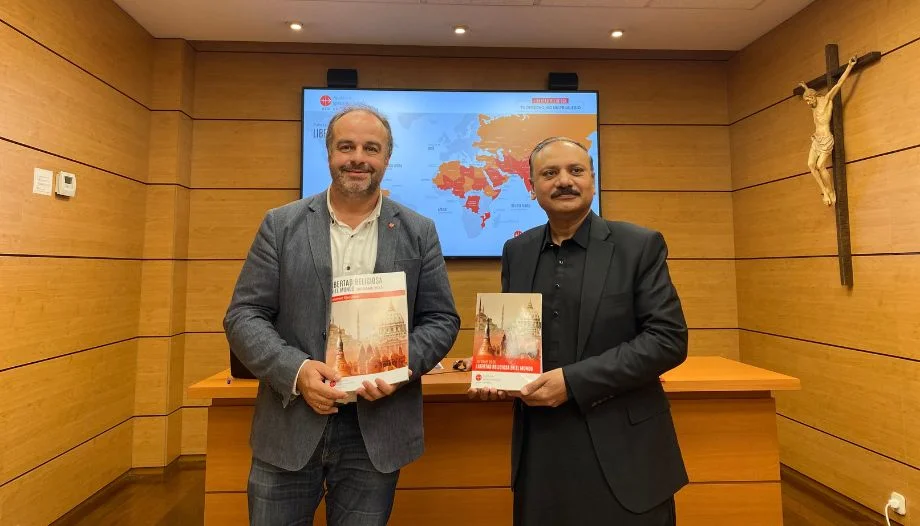"Religious freedom is not improving, it is in free fall" assures José María Gallardo, director of ACN Spain. According to the report on religious freedom issued by Aid to the Church in Need (ACN), which analyzes the period from January 2023 to December 2024, almost two-thirds of humanity (more than 5.4 billion people) live in countries without religious freedom. In 62 of the 196 countries analyzed, religious freedom suffers serious violations and only two - Kazakhstan and Sri Lanka - showed some improvement.
24 countries are in the most serious category, persecution.. Restrictions are systematic and violent: they include repression, arrests, mass surveillance and direct attacks, affecting more than 4.1 billion people in countries such as China, India, Nigeria and North Korea. In 75 % of these countries (in 18 out of 24), the situation has worsened.
Religious discrimination, although less extreme, continues to affect more than 1.3 billion people in 38 countries. In these contexts, religious minorities face systematic restrictions on their spiritual and social life, suffering legal inequality, harassment and marginalization. Although they are not victims of overt violence, discrimination often paves the way for more serious situations. In addition, 24 countries have been flagged as "under observation" for showing alarming signs of deterioration, such as rising religious extremism, weakening legal protections and state interference in religious affairs.
Threats to religious freedom
Among the main threats identified in the report, authoritarianism stands out as the most widespread cause. In at least 19 countries, authoritarian regimes use restrictive laws, digital surveillance and institutional repression to suppress religious life, and foster patterns of discrimination in 33 others. China, Iran, Eritrea and Nicaragua are among the most worrying cases. In parallel, jihadist violence has spread through decentralized networks that operate with brutality in regions such as the Sahel, Mozambique and the Democratic Republic of Congo. Groups such as Jama'at Nusrat al-Islam, the Islamic State of the Sahel Province or the Allied Democratic Forces have turned religious persecution into a tool to consolidate their power and impose extremist ideologies.
The rise of religious nationalism also increases and fuels the repression of minorities. In India and Myanmar, it is the main cause of persecution, while in other countries such as Israel, Palestine or Nepal, it fuels systematic discrimination. In these contexts, the majority religion becomes the defining element of national identity, relegating other faiths to a position of legal and social inferiority. This situation is compounded by the effects of war and organized crime. In regions such as Sudan, Gaza and Ukraine, conflicts have destroyed temples, displaced entire communities and turned religious minorities into strategic targets. In countries such as Mexico, Nigeria and Haiti, criminal groups directly attack religious leaders and institutions to exert territorial control or silence critical voices.
The report also points to an alarming increase in anti-Semitic and anti-Muslim hate crimes, especially following the outbreak of the Gaza conflict in October 2023. In countries such as France and Germany, religious hate crimes have increased tenfold, while Latin America has also seen a worrying escalation. On the other hand, incidents against Christians in Europe and North America have increased markedly. In 2023, nearly 1,000 attacks against churches and Christian symbols were documented, ranging from arson in Canada to desecration and physical attacks in Greece, Spain and the United States.
Another alarming phenomenon is the increasing use of digital tools and artificial intelligence to repress religious life. In regimes such as China, North Korea or Pakistan, technology is used to monitor, profile and punish believers, making faith a motive for criminalization. Likewise, the right to conscientious objection faces increasing restrictions, even in democratic countries, where religious institutions are pressured to act against their principles, for example, on issues such as abortion or euthanasia.
The report also highlights one of the cruelest realities: the double vulnerability of women and girls belonging to religious minorities. In countries such as Pakistan, Egypt and Mozambique, hundreds of cases of kidnappings, forced conversions and forced marriages have been recorded, sometimes involving girls as young as ten years old. Impunity for these crimes is almost absolute.
Despite this bleak picture, Aid to the Church in Need highlights the resilience of religious communities, which continue to offer hope, humanitarian aid and peace mediation in deeply hostile contexts. In places such as Burkina Faso and Mozambique, religious leaders continue to promote unity, dialogue and human dignity through interfaith initiatives. The report stresses that religious freedom is not just an individual right, but an essential pillar of any pluralistic and peaceful society. This report is a clear warning: in the midst of global instability, religious freedom has become one of the major casualties of the 21st century. Its deterioration is not an isolated phenomenon, but the symptom of an increasingly intolerant, unequal and violent world order. The defense of this basic right - the right to believe, practice and live according to one's faith - is more urgent than ever.
Thus, for the first time, ACN is launching an international signature campaign in a global appeal for religious freedom. They invite you to join this initiative to protect the right to believe around the world, which they want to present to the United Nations, the European Union and various diplomatic representatives. You can sign at manifiestolibertadreligiosa.es.








